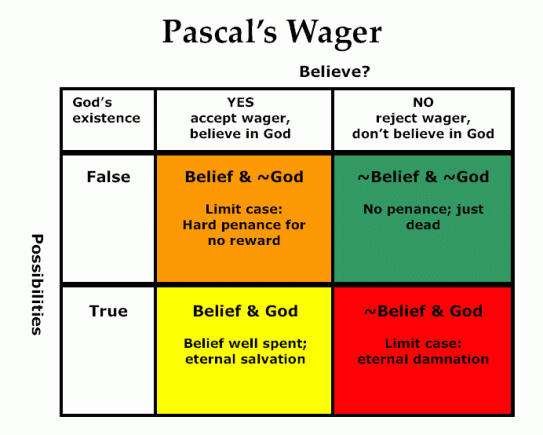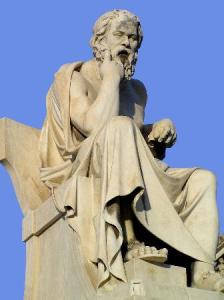Certainly the question of God’s existence crosses each person’s mind irrespective of whether you were born into a Christian household or not. We wonder if it is really true that there is a God and question whether we would be wasting our lives worshipping a non-existent God. It is a question that determines our final destination according to Saint Augustine. It is when we choose to either believe in God or reject him that our eternal home is prepared: heaven or hell. Some say that God is not as merciful as he claims to be if he sends people to hell; nonetheless, it is not that God is not merciful. His mercy was poured out for us on that cross; Jesus suffered more than any words could ever explain just to redeem you and I. When you choose to reject him now, in this life, you choose the devil’s side. That side is the side of rebellion and sin. What you are screaming to God is that “I do not want your goodness and I will take whatever consequence”. How is it that you can call him unmerciful? He is love but will not allow those who reject him to corrupt the paradise he prepared has for his children.
Continue reading
Philosophy
What Influences Religious Lifestyles?
The following article explores various outlooks on whether religious people live their lives entirely influenced by their belief in life after death. This was part of my theological and philosophical studies and I really enjoyed this topic and I hope you do too!
 The Sadducees are not the typical Jews. They only uphold the Mosaic Law; they do not believe in good and evil spirit according to FF Bruce; they believe that God extends his judgement and blessing to us in this lifetime; and they completely reject the idea of any continuation of life after death. Although they are seen as hard materialist, they remain extremely loyal and faithful to their religion despite their belief that there are no eternal rewards in an afterlife. This profoundly proves that people can live religious lifestyles with absolutely zero interest in attaining eternal rewards in an eternal life. Consequently, this demonstrates that people do not necessarily need any motivation of believing in an afterlife in order to have strong religious beliefs and lifestyle.
The Sadducees are not the typical Jews. They only uphold the Mosaic Law; they do not believe in good and evil spirit according to FF Bruce; they believe that God extends his judgement and blessing to us in this lifetime; and they completely reject the idea of any continuation of life after death. Although they are seen as hard materialist, they remain extremely loyal and faithful to their religion despite their belief that there are no eternal rewards in an afterlife. This profoundly proves that people can live religious lifestyles with absolutely zero interest in attaining eternal rewards in an eternal life. Consequently, this demonstrates that people do not necessarily need any motivation of believing in an afterlife in order to have strong religious beliefs and lifestyle.
On the other hand, Pascal’s Wager presents a faith that is wholly grounded in, and therefore driven by, the belief of an afterlife. Pascal endeavours to persuade us to believing in God in order to gain an eternal life; he argues that if God doesn’t exist we lose nothing as opposed to gaining eternal damnation. This evidently presents a faith that is selfish and self-centred; some could argue that it is an immature and an inadequate basis for practising religion. Anscombe argues that basing anything in a ‘reward and punishment’ mindset is wrong and invalid. Certainly, Christians with this approach to religion would be entirely influenced by their fear of eternal damnation in their daily moral decision making. Continue reading
The Nature and Purpose of Life?
This is part of what I prepared for my A2 exam in theology this past June. I hope you enjoy it. At times I look at other perspectives away from the normal Christian view and it’s a bit philosophical as well.
Centred on the account of creation, in Genesis 1, Christians believe God created everything and continues to sustain it as the necessary and transcendent being. Believers say that humans have Devine nature and purpose bestowed upon humankind by the creator, God. Genesis 5:1 says ‘When God created human beings he made them to be like himself’. Such scriptures in the Bible support the idea that humankind is the epitome of God’s creation and best reflect God. In contrast to these Christian teachings, I will also make some references to the teachings within Hinduism about the nature and purpose of life.
1 John 4:17 states ‘as he is so are we in this world’. Evidently, this verse supports the concept that humanity has Devine nature and purpose. However, the ‘image of God’ (seen in Genesis 1:26-27) is interpreted differently and can be subjectively interpreted. There is the representative viewpoint that states that humans posses similar characteristics as God and reflect him in our daily lives. For example, we can reflect God’s omnibenevolence in our relationships when we love people. Additionally, 1 John 4:8 says ‘God is love’ – this is the foundation of Christianity and what defines Christianity. Jesus taught in Matthew 22:37-40 that we should simply live a lifestyle that loves God and people in order to fulfil the Decalogue. Consequently, Joseph Fletcher is correct to teach that we must live by one moral absolute (as our human purpose): love. Continue reading



